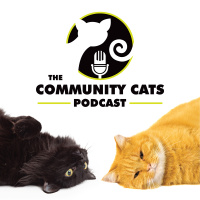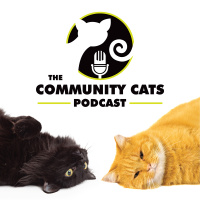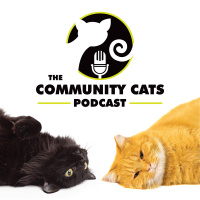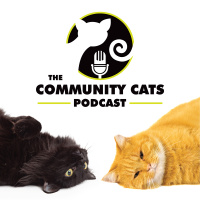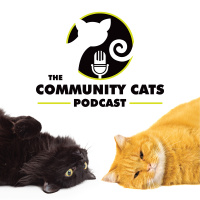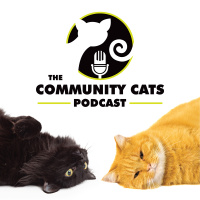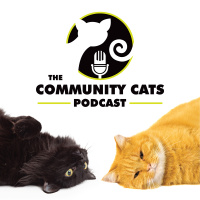Sinopsis
Our mission is to provide education, information and dialogue that will create a supportive environment empowering people to help cats in their community.
Episodios
-
"Relationships and people make all of the work we do in animal welfare possible.”
03/08/2016 Duración: 23minCAT is the largest feline-only shelter in the Pacific Northwest, and Karen outlines their focus on taking in cats from other shelters and rescue groups for necessary medical care and rehoming. One secret to their success is that they are committed to “give each cat the housing and support and care they need to be successful in the shelter and then successful in their adoptive homes.” The Portland area is a pretty great place to be a community cat, she observes, given shelters like CAT as well as the local Feral Cat Coalition, which has provided 80,000 (!) free and low cost surgeries for cats. (Photo taken by Kathi Lamm of Lamm Photography). To find out more visit Cat Adoption Team online.
-
“We’re in the business of saving lives."
02/08/2016 Duración: 21minWith her ten years of at the helm of PetSmart Charities, and her current role leading Central OK Humane, Susana is in a perfect position to share her perspective both as a a funder of animal initiatives, and a recipient of grant dollars. Thanks to previous support from the ASPCA, Central OK Humane has implemented a raft of programs that have brought live release rates to an all-time high. Their high volume, high quality spay/neuter clinic has treated 11,000 community animals since its inception in 2008, and they also have a robust community cats presence, including TNR and a bottle baby program. To find out more visit Central OK Humane Society online.
-
“I think I was born a cat lady.”
30/07/2016 Duración: 16minJulia says that earning her Masters in Animals and Public Policy at Tufts gave her a perfect “launching pad” for what she wanted to do with her life. It also led her to take an active role at the Massachusetts Animal Coalition, which connects volunteers, animal welfare professionals and community members. She details their new program, “AniMatch for Cats,” which facilitates cooperation amongdifferent constituencies to improve outcomes for cats seeking homes. She believes such a program could work anywhere you have people committed to cats and are looking to build additional resources to help them. To find out more visit The MSPCA online.
-
“It’s hard and it’s messy and it’s not pretty, but when it works we can really change policies that impact so many animals.”
29/07/2016 Duración: 27minA veteran advocate for animals, Kara talks about her involvement in several game-changing initiatives — a license plate program and tax check-off — that created funding sources in Massachusetts for spay/neuter programs that have impacted thousands of animals. She also talks about the importance of getting to know your local legislators, and educating them before you need them, rather than after. “Legislators want to hear directly from their constituents,” she notes. While she says a law degree is not essential to playing her role, it helped her develop analytical reasoning that has helped her frame the issues she supports. To find out more visit The MSPCA online.
-
“Diabetes is not a death sentence for cats."
28/07/2016 Duración: 19minHave a diabetic cat, or know someone who does? JaneA describes her experience with her own cat plus the work she does as a member of the “virtual” team that runs Diabetic Cats in Need. (DCIN). DCIN assists cat owners with education and financial assistance to better support their cat’s needs. Since its founding, DCIN has assisted over 700 cats — and loving cat owners. JaneA also discusses how medication and diet can go a long way to assuring that cats have long and happy lives after their diagnosis. She also talks about her blog (written by her cats!) that helps cat owners understand behavior and medical issues. To find out more visit the paws-and-effect.com online.
-
“The connection of one to one is really magical.”
27/07/2016 Duración: 25minAfter reminiscing about their early work together, Bonney and Stacy discuss fundraising strategies and the importance of focusing your message on successes and future opportunities. It can be overwhelming to think about thousands of animals in need, but inspiring to tell the story of an individual cat or situation. Bonney also talks about how to put together an effective non-profit Board of Directors, which she sees as essential to meeting a group’s mission. It’s important, she notes, to make sure Board members have a clear understanding what is expected of them, and to use their time wisely during meetings. To find out more visit the Humane Network online.
-
“I knew I could be the voice for the animals and wanted to help.”
26/07/2016 Duración: 22minMarlan leads a “boots on the ground” initiative to go into Kansas City's underserved communities to provide education, wellness and other resources to keep families and pets together. These efforts include a pet food pantry that distributes more than 40,000 pounds of dog and cat food a year, a MASH-style high volume spay/neuter clinic that aims to treat 10,000 pets a year, and other ways to “make cats better neighbors for us.” He is a big believer in making sure 100% of every feral colony is fixed and describes the feeling of getting that last cat trapped: “you feel like a superhero!” To find out more visit the Spay and Neuter Kansas City online.
-
“We’re all about working through compassion.”
23/07/2016 Duración: 23minThe State of Delaware has legislation in effect establishing a spay/neuter program for non-profits and low-income individuals, which is funded by a $3 surcharge on rabies vaccines. Shauna talks about how those funds are put to work through with participating veterinarians and local shelters. She notes that all types of individuals are necessary to create change for cats: “there are a lot of people do the really hard work on the ground for animal welfare…trapping, foster, feeding” but that she felt her journalism and legislative skills could be put to work to help make these individuals’ jobs easier. To find out more visit the The State of Delaware Office of Animal Welfare online.
-
"Even though we’re behind, we don’t want to be.”
22/07/2016 Duración: 21minShelby describes the challenges of helping community cats in the rural South, where 40% of residents have no access to the internet. So, she reaches out to local social services organizations to get information to individuals who don’t even know what spay/neuter is: “you have to assume that people don’t know and start there.” Her “street team” also distributes flyers at laundromats and supermarkets, noting that you need to reach out to the public in places they normally go. Shelby also talks about her “stray-dar” for finding outdoor cats and the persistent problem of feral dogs in Mississippi. To find out more visit the Mississippi Spay Neuter online.
-
“People may be the problem but they’re also the solution.”
21/07/2016 Duración: 21minAfter TNR’ing 43 cats and fostering multiple litters of kittens, Ashley became “addicted” to trapping and decided that a career in animal welfare was inevitable for her. She speaks about her communications efforts to educate individual neighborhoods about the importance of spay/neuter and the resources available to help them with community cats.. Her staff at Scituate Animal Shelter plays the role of “hotline” for callers concerned about cats, going through a checklist to help them arrive at the right solutions. She also shares her “top tips” for trapping moms and kittens. To find out more visit the Scituate Animal Shelter online.
-
"Community cats are not homeless..they are loved and cared for.”
20/07/2016 Duración: 23minWhen Scott accepted the challenge of joining the Washington Humane Society, their live release rate was 28%…today it is 90%. Scott outlines the various programs that have moved the dial, including improved coordination and cooperation with animal control, their Pets for Life program, and targeted TNR that fixed over 2500 cats last year alone. Today, he’s working with local authorities on helping more low income individuals keep their cats to reduce abandonment with a “Pets in Housing” program. Plus, he lovingly shares his passion for socializing feral kittens, and his foster failures, the “Gang of Four." To find out more visit the Washington Humane Society online.
-
“You don’t have to change the world in 20 minutes."
19/07/2016 Duración: 18minKit reflects on the “bad old days” 30 years ago when “cats were third class citizens, who came in and went out the back door” and there was no formal way for rescues or shelters to share information and build community regarding programs to help them. She describes the kitty she met who changed her mind about cats living outdoors: "When I met his eyes, I realized he was a cat who had his own world and his own way of surviving." She stresses the importance of organizations celebrating every small change they make and building on them. To find out more visit the PetSmart Charities online.
-
“Don’t be afraid to ask complete strangers for help."
16/07/2016 Duración: 26minRachael started her career as an academic scientist and brings disciplined thinking to her cageless cat shelter and TNR efforts. She and her mother founded Here Today, Adopted Tomorrow after attending a Best Friends workshop. She describes how the cats in her care stay healthier because their stress levels are lower and notes that it’s important to have an optimal number of cats: “people get overwhelmed if there are too many cats and they can’t choose and walk out without a cat.” TNR wasn’t her initial interest, but she but began becausel "I saw that it needed to be done.” She’s a big believer in asking questions and learning from others: "Don’t reinvent the wheel…look at what others are doing and do exactly the same thing." **Please excuse the sound quality of this interview. The information is so valuable it's worth sticking with it! To find out more visit the Here Today, Adopted Tomorrow online.
-
"The first thing you want to do is find out who’s going to be a good partner.”
15/07/2016 Duración: 16minNancy, who has been involved in the start-up of community cat TNR programs in Florida and now in Delaware, identifies several of the critical factors for building a successful effort: educating and developing working partnerships with community entities, concentrating on cats in a small area first, and keeping detailed records of the number of cats affected. “Numbers, numbers, numbers…getting grants is all about the numbers.” She also shares her experience mentoring different size groups seeking to build their TNR capabilities, and the different challenges they face. To find out more visit the Brandywine SPCA online.
-
“We all have stories…and it’s those stories that can empower us to believe that we can do more for cats.”
14/07/2016 Duración: 21minIn this episode, Stacy’s in the interview chair and speaks about her motivation for launching the Community Cats Podcast, the wide array of volunteers, services and skills necessary to support cats, and her four biggest priorities for making big picture difference. Among those priorities is fundraising, which Stacy calls “an everlasting challenge” for supporting spay/neuter initiatives: “we’re at the point where we need to offer free spay/neuter, a 20 pound bag of food, and transportation” to get some cats into a clinic…and that requires financial support.” She also introduces us to the concept of the “kitten free zone” that was achieved by the Merrimack River Feline Rescue Society with its efforts on the Newburyport, MA waterfront. To find out more visit the The Merrimack River Feline Rescue Society online.
-
"Cats are resourceful and a lot smarter than we give them credit for.”
13/07/2016 Duración: 22minJessica has had broad exposure to many different functions necessary to helping community cats: TNR, high volume spay/neuter clinics, and even managing a pet food pantry. When she joined Indy Humane, there were nearly 800 cats on the waiting list for spay/neuter services and describes her efforts to shorten these waiting times. She also talks about the “trapper’s rush” she experienced watching three kittens walk into a trap together: “trapping requires a lot of strategy...it’s a game of you against the cat.” She also detail her efforts to provide services and support to community cat caretakers, and the amazing increase in live release rates for cats in her area. To find out more visit the Indy Humane online.
-
"You can save more lives by fixing one cat than you can with one adoption.”
12/07/2016 Duración: 21minJulie applied her for-profit experience and strategic mindset to the issues facing Community Cats in her years at PetSmart Charities and Executive Director of the Feral Cat Spay/Neuter Program in Washington State. She points out how important it is for all groups — no matter their size — to figure out what they do best, and focus on those skills to build sustainability. Rather than try to “do it all,” she recommends that every organization find like-minded partners who complement their expertise. She also shares great ideas about how to personalize fundraising for spay/neuter initiatives. To find out more visit the PetSmart Charities online.
-
“If we can keep a cat that has a solvable, fixable behavior problem in its home, it’s better for the cat and for the owner.”
09/07/2016 Duración: 21minVolunteering at the Gifford Shelter, and helping socialize fearful, shy and semi-feral cats launched Rachel into her role today as a certified cat behaviorist. She describes the cat behavior and retention program she founded at Gifford, and has shared with other organizations as well as the Humane Society of the United States. Her passion for helping those in need extends beyond cats to developing a program for shelters to bring developmentally challenged children in as volunteers, and advocacy for nursing homes to embrace allowing seniors the therapeutic benefit of owning cats. Finally, she counsels Stacy on how to keep her cat Hooch from waking her up every night! To find out more visit the Gifford Cat Shelter online and click here to check out the presentation Rachel mentions in the episode!
-
“Long term vision and careful planning leads to success.”
08/07/2016 Duración: 24minIn this episode, Karen describes how she went about determining what type of efforts and program might best solve the community cat problem in Louisville. She’s a big believer in planning and patience; when founding Alley Cat Advocates, she spent a whole year developing organizational infrastructure so that its future activities would have a sound base to build on. She also talks about coalition building with both public and non-profit animal control and rescues, volunteer engagement, and the importance of partnering not only with community cat caretakers, but respecting and assisting those who prefer to have cats out of their yards and neighborhoods. “We must have a culture of caring,” she notes. To find out more visit the Alley Cat Advocates online.
-
“We simply can’t say, “I’m an animal person…I don’t want to deal with people.”
07/07/2016 Duración: 26minIn this episode, Katie chronicles her wide-ranging activities as a proponent for improving outcomes for cats and communities. She details her work helping improve public policies relating to cats, advocating for coalitions to join together in a community to address their cat issues, and the many resources HSUS makes available to interested individuals and groups who want to work on behalf of change. “The HSUS works to protect all animals,” notes Katie, and then talks about the ways that the cat community and wildlife community need to listen to each other, rather than fight it out. Ultimately, she says, “if you keep the population of free-roaming cats down, you have fewer issues with the birding community." To find out more visit the The Humane Society of the United States online.

